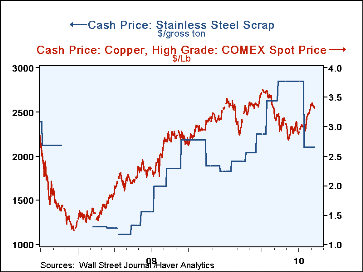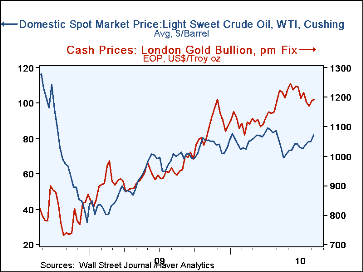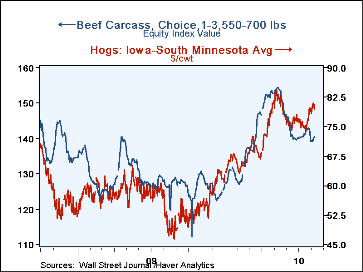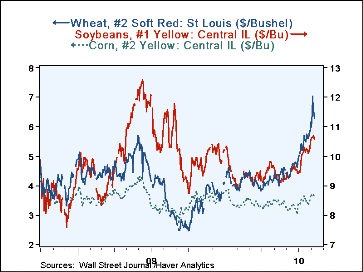 Global| Aug 11 2010
Global| Aug 11 2010Commodity Prices Firm After An Earlier Easing
by:Tom Moeller
|in:Economy in Brief
Summary
Last week, Haver's Louise Curley focused on the sustained strength in wheat prices (+45.6% y/y). The broader product trend shows that most industrial commodity prices recently have either recovered or stabilized after earlier [...]
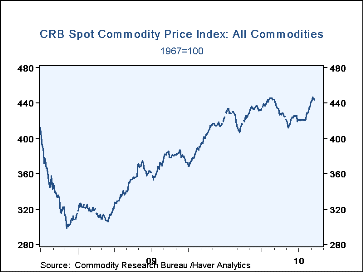 Last week, Haver's Louise Curley focused on the sustained strength in
wheat prices (+45.6% y/y). The broader product trend shows that
most industrial commodity prices recently have either recovered
or stabilized after earlier weakness. Copper prices, in fact, have reached a new
high (+56% y/y) while aluminum (12.4 y/y) and zinc (8.7% y/y) prices also have
strengthened. Steel scrap prices are a notable exception to the recent firming
trend though they're still up by half y/y. Finally, corn
(3.9% y/y) and soybean (-6.4% y/y) prices recently are up. Steel scrap &
zinc prices also have risen from their spring lows. The price of gold is a
favorite barometer, for some, of pending inflationary trends. Generally, it's
had a mediocre correlation with actual price trends but a better one with market
liquidity and risk. But here too there's strength. Gold's price of $1,187 per ounce is up 23.6% y/y
and it's nearly five times its level ten years ago.
Last week, Haver's Louise Curley focused on the sustained strength in
wheat prices (+45.6% y/y). The broader product trend shows that
most industrial commodity prices recently have either recovered
or stabilized after earlier weakness. Copper prices, in fact, have reached a new
high (+56% y/y) while aluminum (12.4 y/y) and zinc (8.7% y/y) prices also have
strengthened. Steel scrap prices are a notable exception to the recent firming
trend though they're still up by half y/y. Finally, corn
(3.9% y/y) and soybean (-6.4% y/y) prices recently are up. Steel scrap &
zinc prices also have risen from their spring lows. The price of gold is a
favorite barometer, for some, of pending inflationary trends. Generally, it's
had a mediocre correlation with actual price trends but a better one with market
liquidity and risk. But here too there's strength. Gold's price of $1,187 per ounce is up 23.6% y/y
and it's nearly five times its level ten years ago.
In the agriculture sector, prices also are up. Wheat prices, indeed, have been notably strong due to severe weather patterns worldwide and, thus, limited supplies. That kept stockpiling restrained. For soybeans, weather factors also raised prices though corn prices moved sideways. Finally, the developing demand for bio-fuel lent further support to grain prices generally. Also in the food area, economic recovery raised hog prices by 30.5% since the recession's end and beef prices by 16.0%. Lastly, textile & fiber prices doubled their 2009 low with increased product demand.
This price recovery follows weakness which accompanied the world-wide economic slowdown early this year. Weakness was most evident in the industrial sector where prices for aluminum, copper, scrap steel and zinc each fell up to one-third from their spring peaks. Lumber and wood prices were even weaker with depressed activity in the housing sector. Meat prices also fell roughly 10%. Conversely, and also in the food complex, wheat and soybean prices were rising to new highs but corn prices fell slightly. Notably divergent from all of these trends has been the price of crude oil. After doubling from the recession low of roughly $40 for a barrel of West Texas Crude oil, prices have varied in a range from $71 to $85 since January.
How much of an impact will commodity prices have on broader inflationary trends? The answer probably is not much, with the exception of oil. As an indicator of product demand, commodity prices have a strong correlation.But the flow-through to final product prices is overwhelmed by development, packaging and distribution costs. At the current time commodity prices suggest that economic recoveries around the world are developing. Fears of pending recession seem overblown, but the likelihood of a re-emergence of broad-based inflationary pressure is low.
The price data used in this report can be found in Haver's WEEKLY and USECON databases.
Tom Moeller
AuthorMore in Author Profile »Prior to joining Haver Analytics in 2000, Mr. Moeller worked as the Economist at Chancellor Capital Management from 1985 to 1999. There, he developed comprehensive economic forecasts and interpreted economic data for equity and fixed income portfolio managers. Also at Chancellor, Mr. Moeller worked as an equity analyst and was responsible for researching and rating companies in the economically sensitive automobile and housing industries for investment in Chancellor’s equity portfolio. Prior to joining Chancellor, Mr. Moeller was an Economist at Citibank from 1979 to 1984. He also analyzed pricing behavior in the metals industry for the Council on Wage and Price Stability in Washington, D.C. In 1999, Mr. Moeller received the award for most accurate forecast from the Forecasters' Club of New York. From 1990 to 1992 he was President of the New York Association for Business Economists. Mr. Moeller earned an M.B.A. in Finance from Fordham University, where he graduated in 1987. He holds a Bachelor of Arts in Economics from George Washington University.
More Economy in Brief
 Global| Feb 05 2026
Global| Feb 05 2026Charts of the Week: Balanced Policy, Resilient Data and AI Narratives
by:Andrew Cates


